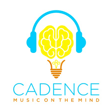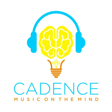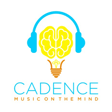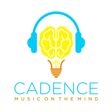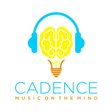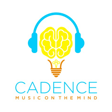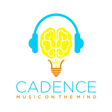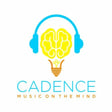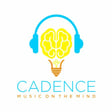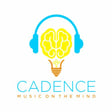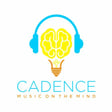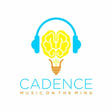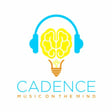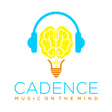Become a Creator today!Start creating today - Share your story with the world!
Start for free
00:00:00
00:00:01

S03 Episode 03: Why Queer Music Matters
Transcript
Introduction to Cadence podcast
00:00:01
Speaker
Welcome back to Cadence, a podcast where we explore what music can tell us about our minds.
Challenges in Self-Expression for Marginalized Groups
00:00:19
Speaker
If you're white and straight and cisgender, expressing yourself openly and finding art that reflects your experiences has been relatively easy for a very long time. But if you're marginalized, being able to say what you think and feel out loud and find art about lives like yours has been a lot more difficult.
Role of Music in Coping and Community Building
00:00:38
Speaker
Throughout history, gay people, trans people, and anyone else who hasn't fit into their communities' heteronormative boxes have had to find ways to cope with the oppression they've experienced and build their own communities or connections. For some, music has been a saving grace, a magnet drawing in like-minded people, and as we've talked about in previous seasons, providing the social glue to solidify friendships.
Significant Contributions of Queer Individuals to Arts
00:01:03
Speaker
From the beginning of time, I think music, it reaches places that nothing else reaches. That was really when it hit me that I can be whoever I want, I can say whatever I want, and I have a medium in which people will listen to me through.
00:01:24
Speaker
For as long as there has been music, there have been queer people making music. You look at fashion, you look at dance. Pretty much any of the art forms, or any art form, writing, painting, anything, queer people have always been involved. That's Darryl Bullock, who writes about the history of queer music.
Barriers Faced by LGBTQ+ Artists in the Music Industry
00:01:42
Speaker
If you look at the history of recorded music, gay people, LGBTQ people have been involved in that industry ever since the dawn. You wouldn't have rock and roll without queer people. You wouldn't have indie music without queer people. You certainly wouldn't have disco or dance without queer people. It's never been a question of whether or not queer people were making music, but it has often been about whether or not queer people could be open about it while making music.
00:02:11
Speaker
What you had kind of immediately after the Second World War, and for 20 years afterwards, is you still had LGBTQ people in the creative arts, but because of the way the industry worked, they weren't allowed to be open. It was assumed that if you were to be open about your sexuality, it would just mean the end of your career. That's why so many artists that we now know were lesbian, gay, bisexual, transgender, whatever,
00:02:36
Speaker
and we now accept them as icons of our community, at the time could not possibly be out because their managers were telling them, if you do this, your career is over, it's death to you.
00:02:52
Speaker
There were people like Liberace who sued the Daily Mirror in London because they tried to out him and he stood in a court of law and said that he wasn't homosexual. And then when he finally admitted to his homosexuality or was outed by the press many years later, the Daily Mirror insisted on a refund.
Cultural Shifts of the 1960s and Queer Visibility
00:03:15
Speaker
It took until the 1960s, thanks to changes in culture brought about by things like the growth of the civil rights movement and the women's movement and a burgeoning acceptance of sexuality, for queer people in music to start speaking up. Decades later, there are still plenty of bigots shouting loudly. There are many places in this country where being honest about your gender identity or sexuality can really mess up your life.
00:03:39
Speaker
And this is a country that is comparatively accepting. There are many parts in the world where coming out as queer is essentially a death sentence.
Nichols' Journey of Acceptance and Change Over Time
00:03:52
Speaker
But in some places, progress has been made. Jean Ann Nichols is an associate professor of music education at the University of Illinois at Urbana-Champaign. I intersect with this topic in multiple ways. I am gay myself. I grew up at a time, I mean, I grew up closeted. I grew up when that wasn't something you talked about very much.
00:04:13
Speaker
It's been an interesting time to be alive and to see the many changes that have come with the LGBTQ community over the years with things that I were, for me as a teenager, being deathly afraid to say anything about or to come out or even to understand.
Impact of Music Education on LGBTQ+ Identity Exploration
00:04:30
Speaker
I even have the language to understand.
00:04:32
Speaker
as a 16-year-old to now see students at that same age, very comfortable in their own skins, very out and about in the community, and I find that heartwarming and affirming. And so in Music Ed, the times have changed, and we've had to change with that. Here's Rod Thomas, who makes music as bright light, bright light.
00:05:00
Speaker
I love listening to classical music, but I hated having to learn, you know, from sight reading and all this stuff, like the classical music pieces, which just had nothing to do with my interest. And then you associate that with being told off in music lessons, never quite getting that tempo right, and it just being a chore. And they didn't
00:05:21
Speaker
know how to make classical music seem exciting and for you to understand how amazing some of the composition is. It was just all, like, boring. You know, like, if you're in school and you have, like, a terrible math teacher, like, math is awful. It's pointless. And then you're like, oh, my God, I use it every single minute of my life.
00:05:38
Speaker
when you're older because they don't teach you how to apply it and I think if people had maybe explained classical music in relation to pop music that would have been much more useful but it just wasn't how the curriculum worked.
00:06:01
Speaker
Then there are the deeper issues of social and emotional learning that I think LGBTQ students can access through music education that they may not necessarily be able to access in school. One of Nichols' students was a woman named Ry Daisies, who is now a singer-songwriter living in Michigan.
00:06:20
Speaker
I often say that Ry knew exactly who she was the moment she was self-aware, but it was the rest of us that needed to go through transition, not particularly her. The work Jeanette Nichols did with Ry was eventually turned into a paper and published in a scientific journal. It talks about how they met together for weeks and recorded all of their conversations. They looked deeply into Ry's history, going through old photo albums, school records, concert programs, her original songs.
00:06:46
Speaker
They talked about Ry's gender identity and her sexuality. The point of the study was to highlight the pivotal role that music can play in the lives of transgender students, especially as they seek community and ways of expressing themselves. And so she tells us in this study that we did really together, I need to make that clear, and she tells me this story about
00:07:11
Speaker
being at a place in her life where she'd participated in her school music ensembles and all this all her life and at the same time was as a teenager going through transition and enduring what sadly most transgender individuals in school often endure, which is haunting and bullying and a number of horrible things that would happen to her daily at school. Here's Ry.
00:07:40
Speaker
I've been living as a woman since I was, you know, in junior high school, but I never took hormones. It wasn't until about two years ago that I started hormone therapy. And really what started it was when I was doing the journal with Jean Anne and exploring myself. I mean, really that was like therapy. And in that, you know, at the beginning of our time together,
00:08:06
Speaker
I referred to myself as a cross-dresser because I had no, you know, there was no representation. I had nobody that I could look up. I didn't even know I was transgender, even though I was transgender. I didn't even know what that meant.
00:08:22
Speaker
And then rereading what Gina and I are working through, that was kind of when the realization set in that I just assumed, oh, well, I'm not on hormone. So I mean, I guess that doesn't mean I'm transgender. And that was when I really came across and it hit me. Oh my gosh, you are a trans woman. You need to quit referring to yourself as a cross-dresser because that's not who you are.
00:08:52
Speaker
Music and her work with Nichols helped Daisies come to terms with her identity. Music also helped give her a voice in the first place. I didn't have a lot of encouragement from other people about my identity. The encouragement came from the music.
00:09:10
Speaker
It didn't matter if you had on pants or a dress, if you can play your instrument, that's what mattered.
Rai Daisies' Journey of Identity Through Music
00:09:18
Speaker
So I think in those spaces, in the musical spaces, that was where I was able to get the respect that I was craving.
00:09:27
Speaker
She told me, you know, every day I had people telling me who I was supposed to be and what I was supposed to do and how I was supposed to look. And it was just constantly every day, every day, every day. And she said, and I hadn't really had my say to myself. And she describes finding the time when she was able to get a piano and have a piano at home, but she was able to kind of craft circumstances in her life where she was able to have access to a piano.
00:09:50
Speaker
And she knew enough about music from her school music learning that she had grabbed a Tori Amos songbook and put it up on the piano because she loved Tori Amos' music and she understood how the clefs worked and she understood kind of how this would translate to the notes on the piano.
00:10:08
Speaker
worked very hard at trying to teach yourself piano using a Tori Amos songbook, which I'm sure is alarming to most piano pedagogues, but there you have it. I started to realize that music can be a tool. It's this language that it's primal. Everybody understands it, even if you don't think you understand it. The music is in you, your heartbeat, the sound is in us. So for me, I wanted to be able to communicate
00:10:34
Speaker
in a way that other people would want to listen to. You know, I've always wanted to be an activist. I've always wanted to stand up for the little guy. But how do you do that without, you know, sometimes unfortunately for transgender women, we come into the angry trans woman trope. And how do you avoid that? How do you get your thoughts across? How do you get your perspective out there without people thinking that you're angry?
00:11:03
Speaker
or that you have a vendetta to fill or something, you know what I mean? It's something that trans women have to deal with every day. And it makes sense that music was a way for daisies to sidestep it. Research has shown that music is a way in which we can process our own emotions to figure out what we're feeling. Because after all, emotions are a lot more complicated than they seem at the surface. Oftentimes, we don't even really know what we're feeling until we analyze it.
00:11:28
Speaker
It's a struggle to know who you are on the inside and to be doing everything that you can to express that in a positive way and to have people not see what you're trying to radiate out. That was really tough for me. And that took, honestly, that's where music came in because for me, I was able to explore myself
00:11:55
Speaker
for starters, but also to try to explore other people and other people's uncomfort and indifference towards who I was. And that almost made it a little bit easier for myself to deal with that, because I came back to, you know, I'm dealing with this, what are they dealing with? What's making them, you know, react towards me the way that they are?
00:12:21
Speaker
So for the LGBT students, whether it was myself as a 16-year-old or our current LGBTQ students in music classrooms across the country, music is this great educator, I think, of our emotional selves and of our social selves. But emotionally, we understand ourselves better because music expresses oftentimes things which we find inexpressible. Because I suppose if we could express it, we would say it. But if we can't say it, then there's music.
00:12:56
Speaker
For music educators, it takes on a certain immediacy that if we are doing our jobs well, we're providing our students with the tools, which through music, they are able to create a self, to have these long conversations with themselves, to work with the emotional materials and to create order and make sense of it.
00:13:22
Speaker
I have another colleague wrote that folks might take a math class or they sit in an English class, but they join the band and they sing in the choir, that there is this connection. And for a lot of LGBT students that are involved with music, those choirs, bands, orchestras, and other community music making are some of the very stuff that helps them negotiate and feel connected and strengthened in order to face the other parts of their life.
Industry Barriers for Trans Artists
00:13:50
Speaker
For students that are marginalized or isolated at other times during the school day, it can be a lifeline. And while Rye continues to make music, the music industry hasn't yet caught up with people like Nichols. Selling music as a trans woman is still hard. I just dropped my new album, Monstress, in July. And when I was writing for the album, I had written it, recorded it, and I was looking for a producer.
00:14:16
Speaker
And I searched from Detroit to Chicago. I was sending out email after email after email, and I kept getting almost the same response, which was, your music's pretty cool, but we don't want to attach our name with a transgender artist. Sorry.
00:14:36
Speaker
I actually on a whim emailed a woman whose music I've been listening to since I was a teenager. Her name is Angel M. And we were kind of internet buddies. And so she is like, well, hi, why don't you send your stuff to me?
Music's Role in Social Bonding and Community Building
00:14:52
Speaker
So long story short, one of my teenage sheroes is now my producer. She is a witch.
00:15:06
Speaker
In all those dreams that I searched for, she seemed to fit
00:15:17
Speaker
The impact that creating music with people who accept you makes is long-lasting and extends far beyond school. Group music making in particular both relies on and increases levels of the attachment hormone oxytocin. When people are given oxytocin, say through a nasal spray, they move their bodies more in sync with music and with each other. There's also evidence that music boosts endogenous opioids in the brain.
00:15:41
Speaker
Yeah, that's the same system that underlays the opioid crisis. So you can imagine how strong it is. And that this system plays a role in the social bonding that is enhanced by grooving to music with others. But it's not just neurochemical release and foot tapping that synchronizes across people. We see entrainment to the beat and therefore to anyone else tracking the beat in brainwaves, breathing rates, heart rates, and other body rhythms.
00:16:05
Speaker
Choral singing in particular seems to be really effective in bringing body and brain rhythms into group synchrony. Here's Tim Selig, the current Artistic Director and Conductor for the San Francisco Gay Men's Chorus.
00:16:18
Speaker
I began in the womb of the Southern Baptist Church. Mom and Dad were both professional Baptists. And I was encouraged to perform right on the piano bench for all the family and friends. I grew up and did all the things that a good Southern Baptist boy is supposed to do. I actually became an opera singer. That was okay. Mom and Dad thought I could minister through opera singing.
00:16:44
Speaker
But I was also working as a minister of music on the side to really make enough money to raise two children and keep my wife in the style which she was accustomed.
Sense of Belonging in Musical Groups
00:16:56
Speaker
But I was living a lie and the first 35 years were amazing. I learned a lot about myself. Of course, the major thing I didn't learn was to tell the truth.
00:17:09
Speaker
And I watched music be used in the church as a vehicle. And I decided I would never use it in that way again. So at 35, I was the Associate Minister of Music of the First Baptist Church of Houston and on the faculty of Houston Baptist University when I came flinging out of the closet. And it was a small mega church of 22,000 members. And so it was quite public and quite dramatic.
00:17:40
Speaker
And I ended up with nothing, literally nothing, moved into a Motel 6. And then I realized that I was not really left with nothing. I had this incredible music to serenade me. And I woke up and thought, well, I should do that. I should do some music.
00:18:20
Speaker
Walking into the audition for a gay men's chorus blew my mind. I had come from this whole 35 years and it had crumbled before my very eyes and I walked into this room
00:18:36
Speaker
and we were making music with no shame and no guilt and no hymns. It was awesome. It's just, and so I, for the last almost 35 years, I have been able to bring that experience to the hundreds of people, both men and women in my choruses throughout these years and watched them as they would walk in a rehearsal and realize that they were home.
00:19:09
Speaker
Music is a wonderful catalyst for bringing people together, for helping people find their tribe, to find their community. When I grew up in school, my first instrument was the flute, like desperately uncool. And I was just stuck in classical music, which just bored the hell out of me.
00:19:25
Speaker
And I didn't get it. I didn't get what music could do in terms of making it because the only thing I was able to do is play all of these like ultra-dry, like turgid musical pieces which meant nothing to me. And then you hear dance music and you're like, wow, this is instrumental and this means everything to me. And then you're like, oh, I can play an instrument and do something that shakes my life without having a word as well. And that's when you're like, right, okay, music is amazing. What can I do with it?
00:19:55
Speaker
Whenever you go into a gay bar or a gay club or a LGBTQ bar or club, there's always a soundtrack. There's always music playing. And it kind of helps to buy in people together. It helps to cement relationships and it helps certainly younger people come into terms with their sexuality and coming out on the scene. It will help them find like-minded people. So for that reason, that soundtrack, the music that those clubs and bars are playing is incredibly important.
00:20:31
Speaker
Music just touches us in such a deep way.
00:20:35
Speaker
therefore it translates to the people in the audience. That's Dawn Harms, music director and conductor of the Bay Area Rainbow Symphony, or bars. One thing she points out is that a symphony of queer people can affect the audience in ways that other symphonies may not.
Activism and Artistic Expression in Queer Music Communities
00:20:51
Speaker
Bars is really cool because it actually changes people's lives, and it sounds a little, again, Pollyanna, but it does. It changes people who are playing the music because of the suffering, and it changes the audience's minds and hearts
00:21:05
Speaker
those who maybe had a question. We're just people. For symphonies like bars, the audience isn't just being moved by music. They're being moved by music being played by people who they know are queer. It's a big deal. I don't want to think we're just this downer orchestra, but it really is through the depths of music that we're able to express this pain. And it becomes a joy at the end because, you know, to me, the bookends of pain is joy.
00:21:33
Speaker
The whole history of gay and lesbian choruses is fascinating because it started out as a party, like we're going to party and we're going to sing. And then when the AIDS pandemic hit, the choruses became the consolers and the healers and the caregivers, and they grew up. What came out of that was this activist part. So as far as I'm concerned, the chorus has always done a really amazing job of taking care of the twins
Music as a Safe Space for Identity Exploration
00:22:03
Speaker
And the twins are activism and art or music and mission, whichever you want to use, but we feed them every day. Every single day we get up and we go, okay, how would you make our art better? And how do we achieve our mission of changing people and the world?
00:22:20
Speaker
When you're in the band room, it's not about who you are or what you look like. It's about the talent and the drive and the ambition. So for me, that was my only chance that I really got to shine.
00:22:39
Speaker
There was, you know, I did pretty well in my other classes, but that was the one place that I wasn't judged. I wasn't treated any differently. It was about, can you play this piece or can you not? And I think that's pretty powerful, you know, to have a space that kids can come in and, you know, leave the troubles of the world behind them. You know, it sounds a little silly, but it's true. It's true when you're going through a rough patch at home or
00:23:07
Speaker
in the community or in life or whatever and you come together and you're in the group of people and you all are working towards the same goal to, you know, play this piece beautifully, you're creating magic together. And I think it's a little bit harder to hate somebody who is helping to create that magic with you. The takeaway is that having an opportunity to create music is powerful and hearing yourself represented in music that other people make is powerful too.
00:23:36
Speaker
When I was growing up in the Welsh coal mining valleys where absolutely nothing happened, I was looking probably subconsciously at television, film and radio as a way to learn about the world outside of my immediate surroundings, right? So all around me there was like Greenfield, a bungalow, a farm, that's it. So I learned a lot about
00:24:02
Speaker
probably who I wasn't from listening to music and watching things like Top of the Pops. And that's how I learned about a lot of artists. But I didn't have anyone that I thought was, I wouldn't say a role model, but I didn't see anybody that I related to. So I knew that I wasn't, in quotation marks, normal, which was white straight.
00:24:22
Speaker
And I knew that I wasn't quite that. And none of the role models who were out, Andy Bell and Elton John, they were so fabulous and so otherworldly.
Emotional Processing and Empowerment Through Music
00:24:32
Speaker
I felt so normal. So I thought, I can't be like them.
00:24:36
Speaker
I don't know what I am then. They were all these kind of very fabulous, very confident, very flamboyant performers who could command a room and I didn't feel like that as a kid. So I think I really struggled for many, many, many years to understand what I was and what I wasn't and how I fit into their story.
00:24:56
Speaker
constantly surprised by the emotion that music pulls out of me, to be honest. One of the first pieces that I really, really remember was Mars in the 5-4 time. And I just loved playing that and I felt like strong and
00:25:14
Speaker
powerful and I was just rocking out on the xylophone and I remember thinking like this is what music is supposed to be. This is what it's supposed to be like. This is how it's supposed to make you feel strong, not weak, strong. I had a person when I moved to San Francisco knew of my classical roots and they said well I hope you're not bringing
00:25:40
Speaker
You know, that flamboyant kind of music to the stage. And I was like, oh my gosh, yes, I am. I was not allowed for 35 years to use a boa. You're going to see it on the stage. So just get ready for it.
00:26:00
Speaker
There is something to be said about the fact that gay and lesbian people are put into this box to be in the closet and suppress your emotions from our whole spectrum. And boy, when we break loose, it's joyous, even with the pain that we experience.
00:26:21
Speaker
Music isn't monolithic. However you're feeling, whatever you're going through, music has the potential to help you through it. We know that music is listened to for many different reasons. We also know that there are many different neurotransmitter systems involved in these different uses of music. For example, when music is helping us get up and move around, we see higher levels of dopamine in our motor regions, among other places.
00:26:42
Speaker
And oxytocin that we've already talked about helps us bond with each other. When music is helping us exercise, we see higher levels of endorphins. When music helps us focus, we see activation in parts of the frontal cortex and the parietal lobe that are involved in paying attention. So just as we use music for different purposes, we can see just as many different signatures and traces of music's effects on our brains.
00:27:10
Speaker
Use your voice however you see fit to use your voice. If it's through a trumpet or singing tenor, everybody has something to say. Everybody has a story to tell. Everybody's story is different and unique and beautiful. So find your community, find your safe zone and let it out. Be as loud as you can. There's literally no one on the planet that hates music.
00:27:34
Speaker
There might be 10 people and we don't want to know them or invite them to dinner. It's just the carrier for the most beautiful
00:27:44
Speaker
There are always going to be kids that need that comfort. They're always going to be kids that are beaten up. They're always going to be kids that are picked on. They're always going to be kids that are bullied or that their parents don't understand them or their churches don't understand them or whatever. Then they're going to need to be comforted by playing the MP3 or sticking on that disc or whatever else it might be and appreciating that someone out there gets them.
00:28:10
Speaker
Find a way to express yourself because if you can't, it's just gonna grow inside of you. You have to let it out.
Conclusion and Credits
00:28:17
Speaker
Let the world dump shit on you and grow flowers from it. Don't become a mud puddle.
00:28:24
Speaker
Thanks for listening to this episode of Cadence. You can find us online at the ensembleproject.com slash Cadence, or wherever you get your podcasts, and you can support us at patreon.com slash Cadence podcast. Cadence is produced by Adam Isaac and me, Andrea Viscontis. We also created and write the show.
00:28:42
Speaker
Our intro and outro come from acclaimed New Zealand producer Rian Sheehan. We also featured music by Rai Daisies and Bright Light, Bright Light in this episode. Additional production help for this episode came from Katie Lindhart and Scott Lowry. You can find me on Twitter at IndreVess. Cadence is generously supported by the Germanicos Foundation.
